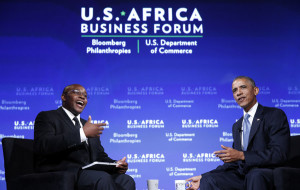While all the press was about the “historic” summit between Africa and the United States, make no mistake about it: This summit is essentially another expression of the Asia pivot. Coming as it did in the twilight of President Obama’s term, it clearly is not about Africa. The sums of money were not so significant but the symbolism was clear: the West, not China, will dominate Africa.
The business deals announced came with the imprimatur of all the Blue Blood American Brands: GE, Coca-Cola, IBM. All the assorted African leaders careened around downtown Washington between their luxury hotels, various photo-ops, receptions, panel discussion and press conferences. There was of course one major White House dinner, but the president made sure to remind African leaders of their subordinate status by refusing extensive individual meetings with any national leader.
Further, the summit served the supplementary purpose of being a prop in the battle over the Export-Import Bank. Big business is terrified that the corporate welfare that flows from the Ex-Im Bank is going to be cut off by Congress when it reconvenes in the fall. In the summit’s opening days, the front-page of the Financial Times featured most prominently a “warning” from GE CEO Jeffery Immelt that refusal of Congress to renew the bank’s charter will imperil American-African economic ties. This set the stage for the $3 billion of Ex-Im deals struck at the summit to be spun as necessary to maintain “American” leadership over China—and anyone else—in Africa, and by extension everywhere else the bank’s cash greases the wheels of corporate America’s oversees efforts.
The various officers of the executive branch and the president were surprisingly light on their usual moralizing tone, and President Obama made sure to affix his broadest smile across his face while posing with any number of odious characters.
He did, however, deal with the issue. Saying that his administration found “value” in working with countries that are “generally good partners” but are “not performing optimally when it comes to all the various categories of human rights.” The United States uses “humanitarian” concerns as a Trojan Horse in all sorts of wars, skirmishes, and other activities geared towards regime change. To so blatantly contradicts these alleged standards, exposes the contempt the government has for the people of the nation and the world.
Along with the flashy business deals, the summit saw the U.S. add $110 million onto already large expenditures on military deals with African nations. Perhaps the most significant part of American aid, the United States, under the guise of anti-terrorism, has strengthened its military ties with a number of geo-strategically important countries.
This gives the U.S. a strong influence in the governments of Ethiopia, Ghana, Uganda and Rwanda to name a few. Using this military activity, the U.S. government is establishing spheres of influence in the Sahel and Horn of Africa, and helping prop up several other friendly regimes.
The conference had its humanitarian turn as well when the president announced a significant boost to a program bringing electricity to homes across Africa. The Kennedy Center played host to a gathering of Michelle Obama, Laura Bush, the assorted African First Ladies and various hangers-on related to the “empowerment of women.”
The message of such a symposium existing separate and apart from the actual summit said it all: The guys talk business in the study, while the ladies repair to the kitchen.
Ultimately, the premise that that the United States can “counter” China in Africa economically is faulty.
First and foremost, African countries are not simply passive actors waiting to be pawns in some existential power struggle between America and China. With the unipolar world declining, African nations, like just about all other nations in the “Global South,” have their own regional and international ambitions. This is part of the basis of the long relationship, dating back to the 1950s, between China and many African nations.
During the early phases of the Chinese revolution, China built ties with many African nations with whom they shared the kinship of being a part of the post-WWII wave of anti-colonialism where many nations were becoming either socialist or at least challenging imperialist hegemony.
This is why China is often seen as more of a partner than the West: a combination of long-held ties and the status as a fellow developing nation. This often carries over in the modern day by the willingness of China to gives loans at very easy interest rates, and to participate in developing extensive infrastructure projects that are a major boon to development strategies in many nations.
Most African nations, then, do not trade with the West or China; they trade with both and attempt to leverage the two nations against the various goals of the various capitalist elites in particular countries or regions.
In fact, the comparatively smaller military investment is significantly more relevant. To the extent the United States can become the key guarantor of the stability—or existence—of particular regimes, the greater the potential influence. This creates American-controlled spheres of influence in key locations, helping to maintain global U.S. imperial leadership, and stunting the efforts of China (and others) to establish a multi-polar world order.
Hence the summit was in actuality an exercise in public relations that produced some limited but shiny business deals, gave the perception the United States cares about Africa, and provided an excellent cover for furthering the militarization of the African continent by the West; with the added bonus of using geo-political rivalry to protect corporate welfare.






